Chair Professor Fan Xitao
Prof. Fan Xitao is the dean of the Faculty of Education, University of Macau (UM). He is a well-known expert on quantitative (especially multivariate) methods and educational/psychological measurement. He has published over 100 journal papers and book chapters. He was the first Chinese scholar to be appointed editor-in-chief for Educational and Psychological Measurement, a major academic journal in education in the United States; he held this position for two terms, showing international recognition of his academic status.
Prof. Li Yangmin
Prof. Li Yangmin is the director of academic research in the Faculty of Science and Technology, UM. He is a well-known scholar in robotics, automation and control systems. Many of his projects have received support from the Science and Technology Development Fund of Macao SAR and UM’s Research Grants. He is on the editorial board of numerous top-tier international journals, including the IEEE Transactions on Automation Science and Engineering and the IEEE/ASME Transactions on Mechatronics. He has published more than 280 academic papers.
In March 2013 Thomson Reuters released the preliminary list of Highly Cited Researchers. Two UM professors made the list. They are Prof. Fan Xitao and Prof. Li Yangmin. The list includes authors of the most influential publications in 21 broad subject categories in life sciences, medicine, physics, engineering and social sciences, based on citation metrics. Researchers on the list represent less than one-half of 1 per cent of all published researchers, and their citation frequency in their respective areas of expertise ranks among the world’s top 1 per cent.
Citation frequency is an important measure of a university’s research achievements and the academic standing of its faculty. In recent years UM has increased funding in scientific research and recruited high-quality academic staff internationally, leading to considerable improvement in teaching and research. The fact that two UM academics joined Thomson Reuters’s Highly Cited Researchers List and that the citation frequency of their published papers hits new highs demonstrates the university’s orientation and the policies it is implementing have been successful. In this interview, Prof. Fan Xitao and Prof. Li Yangmin share with us how they feel about being named Highly Cited Researchers as well as their future research plans.
J: Journalist F: Fan Xitao L: Li Yangmin
J: How many journal papers and book chapters have you published so far?
F: So far I have published more than 100 journal articles and book chapters, with about 70 journal articles published in SSCI- or SCI-indexed international journals. I’m happy to see that some of my research publications have been noted and cited by many researchers in different disciplines. I hope that I can keep up this momentum in the future. In the field of education, to publish in internationally competitive SSCI- or SCI-indexed journals could be more of a challenge, as many journals in the field of education are not indexed by SSCI or SCI. All these make SSCI-and SCI-indexed journals more crowded and more competitive. In addition, education research tends to have a stronger local or regional cultural and social context. So for education researchers, it is important to frame the research questions in such a way that they would be internationally appealing, thus better suited for internationally competitive journals.
L: I have published 287 papers so far, including 97 journal papers, 20 book chapters, and 170 conference papers.
J: How do you feel about being named Highly Cited Researcher?
F: Usually, one may not be able to accurately predict which research publications would attract more attention. What a researcher should focus on is producing high-quality research outcomes (eg: journal articles) on cutting-edge issues and topics that have considerable appeal in one,s discipline, and then publishing the outcomes through internationally competitive outlets. Over time, one’s efforts are likely to be rewarded and recognised by the community of researchers and scholars.
L: I am proud to have been named Highly Cited Researcher and I think it is a pleasant surprise to me. This honour is a reward for our past efforts, and we will work harder towards bigger goals in the future. I just received the Long Service Award (15 years) from the university. I joined the university in 1997 as an assistant professor, was promoted to associate professor in 2001, and became a full professor in 2007, so I guess you could say I grew together with the university every step of the way. Because I have worked at UM for a long time, most of my papers have been published in the name of the university. According to The Web of Science (WOS), I’m ranked ahead of all academic members in terms of the number of published papers. Now UM is recruiting more and more excellent faculty members, which means I will need to work harder to keep my leading position. I appreciate the support from the top management and administrative colleagues. If every faculty member can be named Highly Cited Researcher, UM’s ranking will also be higher according to the H-index. You can see that many universities in Hong Kong and some universities in the United States have lists of all academicians, fellows and Highly Cited Researcher on their websites, not only to recognise individual achievements, but also to provide important data for university rankings and to attract the best people.
J: What’s your future research plan?
F: Since I joined UM to lead the Faculty of Education (FED), my main focus has been on building a research culture in the faculty, under which education research will be valued, and academic staff will feel excited about conducting research and disseminating education research outcomes through scholarly competitive outlets. This has been a challenge, and is likely to remain one in the near future. Personally, I am getting more and more involved in some research projects in collaboration with my colleagues here in FED as well as with researchers elsewhere. Through my increasing involvement in collaborative research with my colleagues here in FED, I hope we can develop a rich research culture that will help us to make more contributions to UM’s research mission.
L: My main research interests are robotics, control and automation. My focus in recent years has been on micro/nano robotics, which use a micromanipulator to realise micro- and nano-manipulations. My team has attained some achievements in this novel research area, and we will consider practical applications of this state-of-the-art technology. My other research interests include developing service robots to help senior citizens and people with disabilities, which I think will have more practical applications in Macao.
UM has always spared no effort in developing scientific research. In recent years, the university’s top management has formulated a blueprint for transforming the university into a research-focused university. This, combined with a clear, shared goal among academic staff to attain first-class achievements, has led to some very good academic results. Compared to 2008, the number of SCI research papers by UM academics in 2011 grew 90 per cent, and the citation frequency of published papers grew 85 per cent. In certain areas, such as microelectronics, Chinese medicine, and the Internet of Things, UM already ranks among the top in the Greater China region in terms of papers published at major international conferences and in prestigious journals. According to the latest statistics from WOS, the numbers and citation frequency of published papers by UM academics are steadily increasing, now ranking No. 1 in Macao. The number and citation frequency of published journal papers by UM academics were 372 and 2,338 in 2012, up 61 per cent and 35 per cent from 2011, respectively.
More and more UM academic staff have gained recognition at national and international levels. Vice Rector Rui Martins was elected corresponding member of the Portuguese Academy of Sciences. Prof. Iu Vai Pan was elected fellow of the American Society of Civil Engineers. Prof. Philip Chen was elected president of the Systems, Man, and Cybernetics Society of the Institute of Electrical and Electronics Engineers (IEEE). Prof. Fan Xitao was selected fellow of the American Educational Research Association. Prof. Ben U received the Prize for Scientific and Technological Innovation 2010 from the Ho Leung Ho Lee Foundation. The microelectronics team received the second-class State Scientific and Technological Progress Award. Rector Wei Zhao, a well-known expert in computer and information sciences, was appointed chief scientist for a project under the National 973 Programme.
To improve teaching and research and to produce outstanding graduates, a university must have high-calibre faculty. That’s why in recent years UM has stepped up efforts in internationally recruiting excellent academic staff, especially chair professors. So far nine well-known scholars have joined UM as chair professors, considerably increasing the strength of the university’s faculty. Looking to the future, UM will build on this strong foundation and make full use of the new campus in order to achieve the goal of becoming a world-class university.
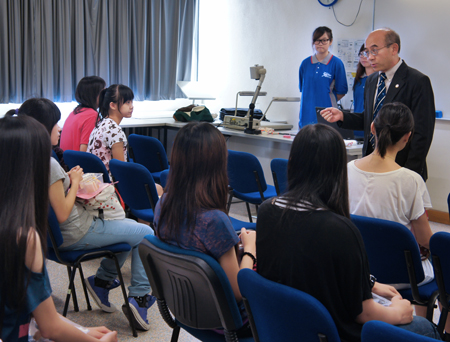
Prof. Fan Xitao has been very fruitful in his educational research
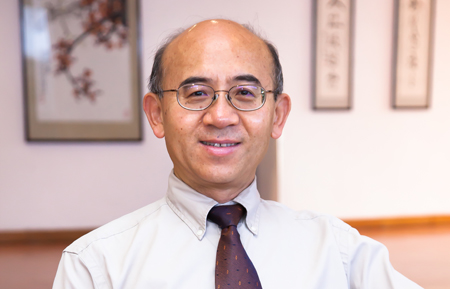
Prof. Fan Xitao
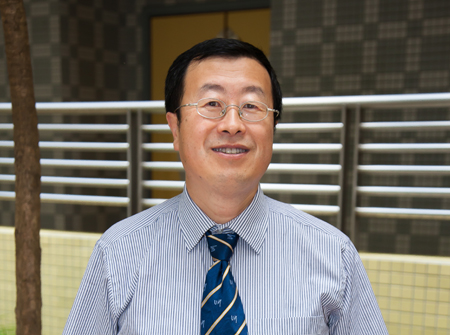
Prof. Li Yangmin
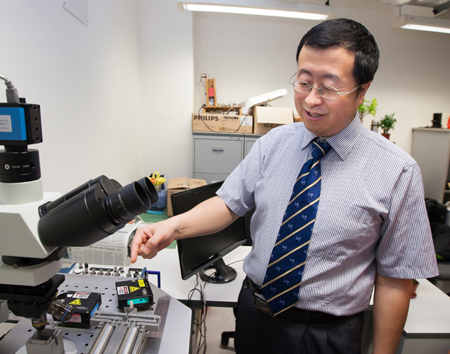
Prof. Li Yangmin’s focus in recent years has been on micro and nano robotics
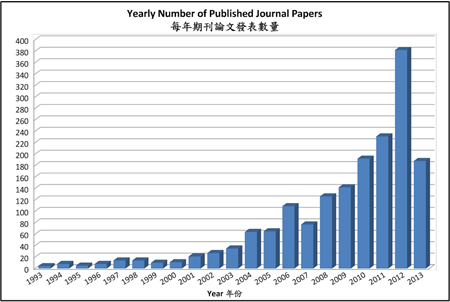
The Web of Science statistics show numbers and citation frequency of published papers by UM academics hit new highs (As at 30 June 2013)
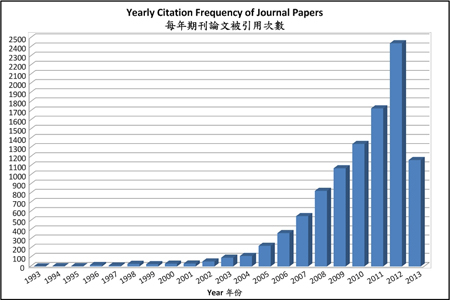
The Web of Science statistics show numbers and citation frequency of published papers by UM academics hit new highs (As at 30 June 2013)
